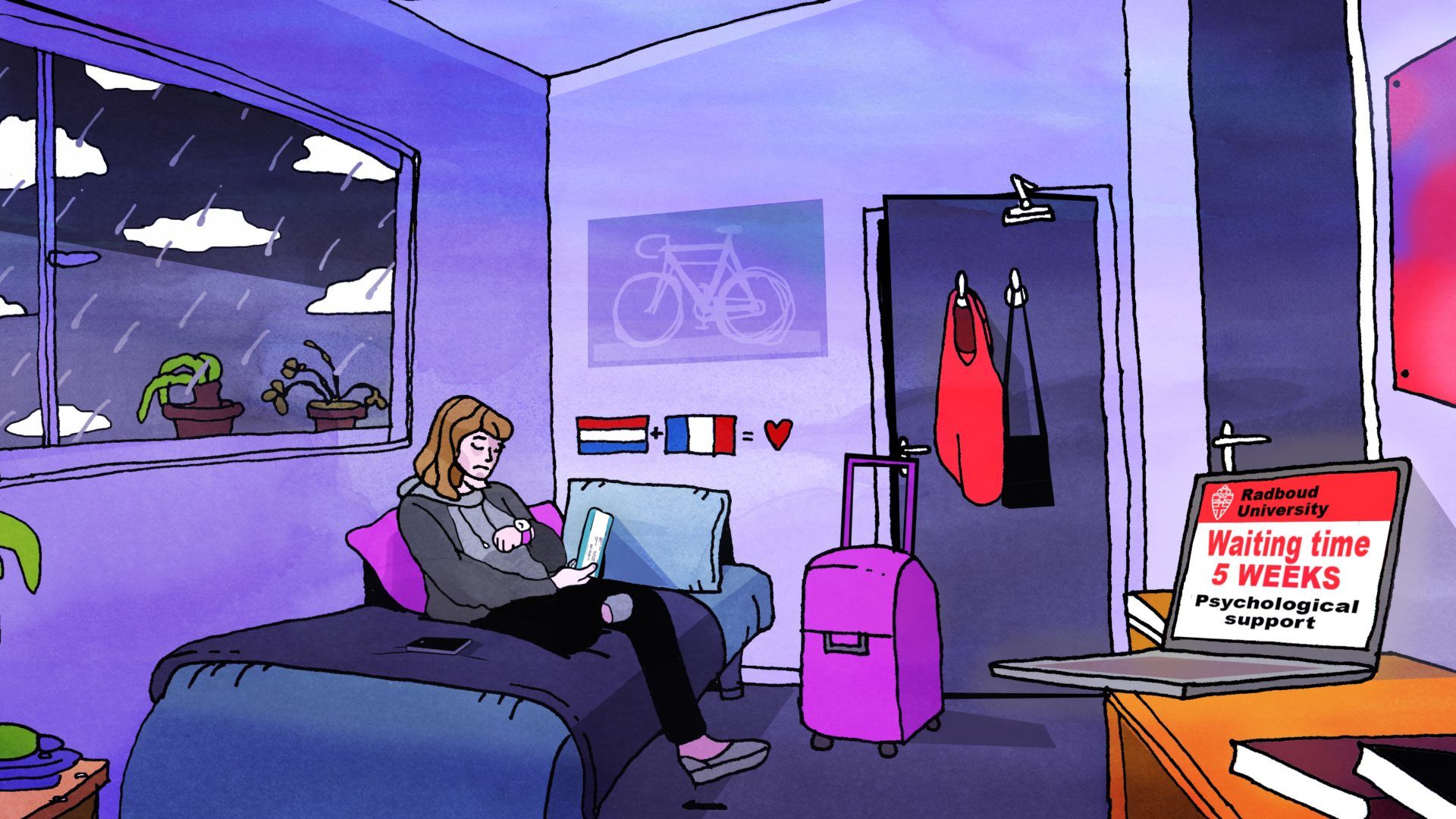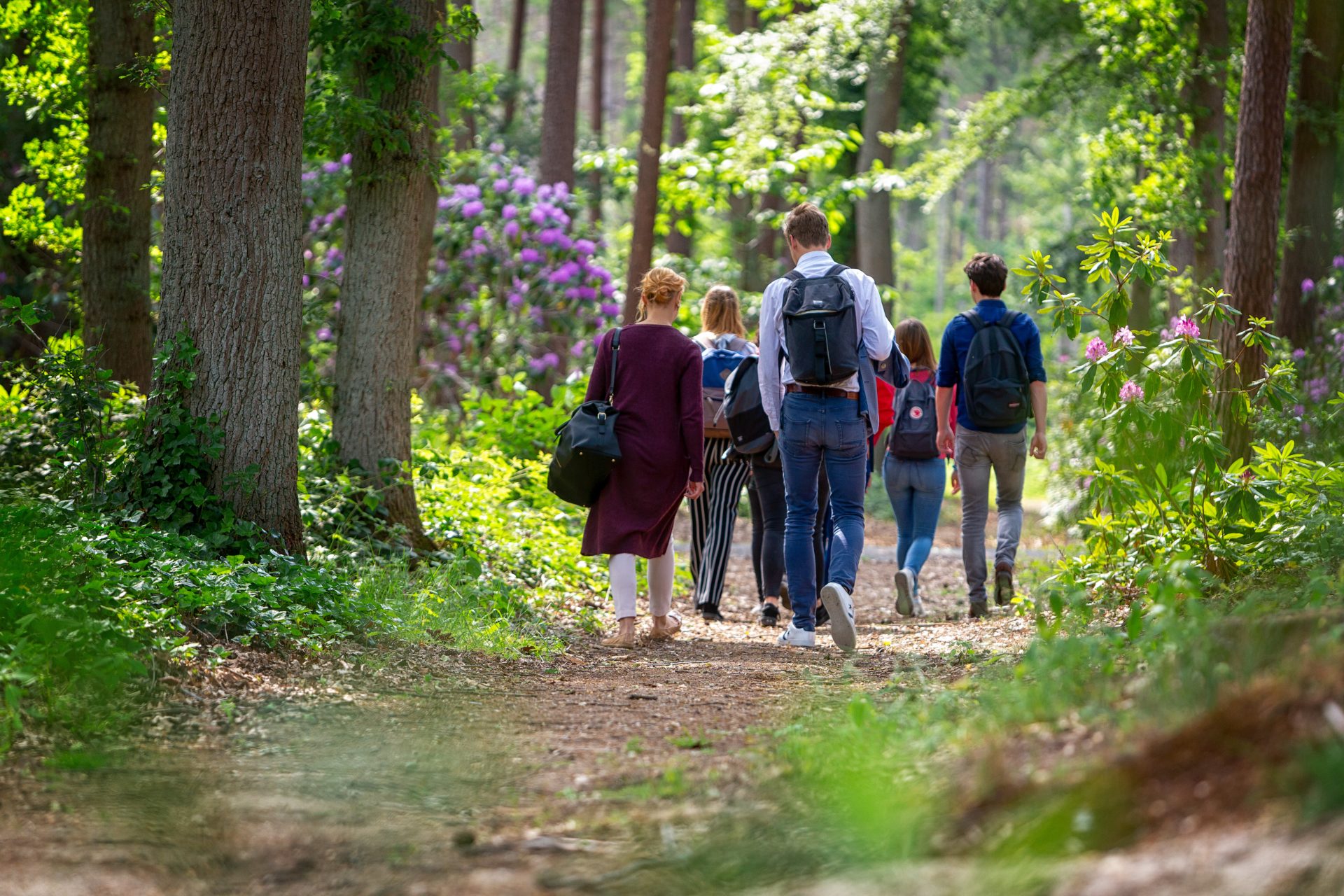Limits to growth (7): student psychologists working overtime
-
 Illustratie: Ivana Smudja
Illustratie: Ivana Smudja
Radboud University grows a little bigger every year. How do fuller lecture halls impact teaching, student life and the city of Nijmegen? In the Limits to growth series, Vox explores the university’s growing pains. In part 7: the pressure on student counsellors and psychologists is growing. ‘The more students there are, the less they feel at home at the University.’
Trying to make an appointment with a student counsellor because you are facing study problems? It can take a while according to the Radboud University website. The student psychologist’s page also warns of ‘longer wait times’.
Leonie Oude Veldhuis knows how difficult it can be to get help. The student at Nijmegen’s European Law School tried to get in touch with the student advisor halfway through her first year (2018-2019). ‘I got completely stuck. I stopped eating, I stopped sleeping, I couldn’t do anything anymore. But the student advisor told me that my problems are due to a lack of motivation.’
Limits to growth
In the coming weeks, Vox will highlight the steady growth of Radboud University. This is the fifth article in the series.
1. The growing pains of the university
2. Active student life under pressure
3. Fighting for office space
4. The sports centre is bursting at the seams
5. The explosion of psychology in 2016
6. Is the campus still easily accessible?
7. Lecture halls full of unhappy students
8. Student recruitment without growth ambitions
Oude Veldhuis was not referred to a student psychologist. Her request for help was rejected by her student advisor. ‘I asked if I could follow lectures from home, but that wasn’t allowed.’ She stopped studying and sought help from a psychologist herself. She resumed her studies in 2021.
She was told to graduate as soon as possible. ‘But they didn’t give me the time I needed to do so,’ says Oude Veldhuis. According to her, this is because of the fact that the student advisors are too busy. ‘I’m just a number for them. You immediately end up in a standard step-by-step plan with a 15 minute interview. If you run out of time when you’re discussing things, you have to make a new appointment. It never feels like you get much attention.’
Waiting seven weeks
‘We can hardly cope with the level of demand,’ confirms Alex Roomer, head of the Student Support Department at Radboud University. ‘The student counsellors have never been as busy as they are now – not in their 20 years of existence. A few years ago, you could make an appointment with the counsellor the same week you called. Now you can wait up to three weeks.’ The number of contact moments with students has also increased to more than 3,000 per year.
Student psychologists also have to deal with waiting lists. The waiting time can be up to seven weeks around November and April. Six to ten students report to Student Support every day. Roomer: ‘Our aim is to meet with everyone within three weeks, but we’re not managing this. It’s frustrating because when you need help or access to the facilities, even one week of waiting is too many. This is why we tell students to make an appointment with their own GP. That way something happens.’
He says that international students seek out Student Support more often. ‘They have to be more self-reliant. Dutch students have family and friends, which is very important when you’re not feeling well.’
According to Roomer, the provision of aid is not due to the rapid growth in student numbers. ‘Our capacity has only grown partially. Thanks to the NPO funds (National Programme for Education), we were able to appoint one extra student psychologist last year, but once that subsidy stops, I don’t know how we’re going to cope.’ Very recently, the Executive Board decided to temporarily create extra capacity in student support again.
Coordinator of student welfare Hannah Markusse adds: ‘There is likely another group of students that needs help, but never approaches us. According to the research figures from the Dutch National Institute for Public Health and the Environment, more than 60% of students suffer from unhealthy levels of stress.’ She sees the situation in bleak terms. ‘In some study programmes, it is now impossible for the student advisors to get to know all their students.’
Lack of connection
Student Support provides specialist counselling for students. Many students end up there after being referred by their student advisor or career officer. It employs student counsellors, student trainers, career advisors, student psychologists and, as of last year, three social workers specifically for international students.
Student Support’s project, ‘Student Counselling 2023’, aims to offer more low-threshold counselling, including e-health. The department hopes to be able to help more students faster with it.
But why are so many students so unhappy? According to Markusse and Roomer, many students feel disconnected from each other. During the coronavirus pandemic, their connection with the University diminished even more. Last year, it turned out the pandemic had taken a toll on many students. Concerning, according to Markusse. ‘Your student days should be a good time, not marred with burn-outs and loneliness. If you enjoy studying, you can also make a bigger impact on society.’
Roomer believes that the pressure on Student Support is also an indirect effect of the growing student numbers. ‘Maybe students feel lost because of the numbers. The more students there are, the less they may feel at home at the university.’
The Executive Board is aware of this danger. According to Rector Magnificus Han van Krieken, this is why study programmes try to keep education small scale. ‘You can see a single large programme as four small ones. Study programmes like Law have a few large lectures, but otherwise, you work in small groups. That way you can make sure that students see each other more often.
Performance culture
But no matter how hard studies try to remain small-scale, students remain unhappy. Markusse thinks that the psychological complaints can also be attributed to the performance pressure that students experience. ‘I often see students who want to go the extra mile to improve their CVs, but then completely burn out after a while. To think that we have made a culture that values performance this much.’
Sometimes, as a society, we need to adjust our expectations, agrees Roomer. ‘We have to accept that we cannot all reach the top.’ Not every setback can be solved with treatment, he says. Still, he hopes that more student counsellors, career advisors and student psychologists will be hired. ‘If you grow this much as a university, you have to think about how you can keep supporting all these students.’
Fresh Thoughts
Leonie Oude Veldhuis is a board member of the platform Frisse Gedachtes (Fresh Thoughts) Nijmegen, which helps students suffering from stress or loneliness. ‘We want to take some of the pressure off student psychologists,’ she says. ‘We can’t do what they can of course, but we can listen and talk. It can be very helpful if you realise you’re not the only one with negative thoughts.’





